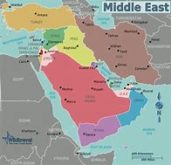Al-monitor – For the first time since the start of the Syrian war, representatives of the Syrian government and the rebels gathered last week in Astana, Kazakhstan, to talk about ways to strengthen the current cease-fire and further push it toward a political settlement. However, as the talks concluded Jan. 24 with a joint statement from Russia, Iran and Turkey, some new ambiguities emerged on the exact role each of these players will have in the next phases of the political process. According to the statement, the three countries emphasized their role as the guarantors of the cease-fire and their shared commitment to fight terrorist groups. But the very fact that the rebels refused to sign the statement raised speculation about the limits of this newly established trilateral mechanism.
AUTHOR Hamidreza Azizi
If we consider the issue from a wider perspective and in relation to some of the stances taken by the rebels during the talks in Astana, it could be said that their objection to Iran’s role was the main reason behind their refusal to support the statement. In his remarks on the first day of the talks, the head of the Syrian rebel delegation, Mohammad Alloush, questioned Iran’s commitment to the cease-fire while accusing Tehran of complicating the situation by supporting armed pro-government groups in Syria. At the same time, some reports indicated that the rebels would accept a guarantor role for Russia, but not for Iran. At one point, Alloush even threatened that if the talks end in failure, the rebels would restart their fight against the government.
Although the shaky agreement between all sides to continue the political process prevented such a threat from being realized, this could have some important implications down the road. However, first, there is a need for clarity on why the rebels have taken such a hard stance toward Iran’s involvement — and are keen to stick with it. In other words, the rebels know that after experiencing a heavy blow in Aleppo and elsewhere they are no longer in a position to dictate strict conditions and have no option but to remain at the negotiating table — yet they still hope to reshape the roles of the regional and trans-regional actors. Why?
First, it seems that the rebels’ strategy looks primarily to the next stage of the process, meaning the political talks that are supposed to be held in Geneva later in February. The Astana talks were mainly based on the trilateral mechanism devised in Moscow, where Russia, Iran and Turkey agreed to prepare the ground to find a political solution for the Syrian war. Tehran, relying on the “exclusive” nature of the initiative, strongly ruled out the participation of the United States at the Astana talks, while at the same time Moscow believed in the necessity of cooperation with Washington. While Russia in the end agreed to limit the US role to that of an “observer,” it seems that for the next stage, one should expect more serious US participation based on the current Russian stance.
It seems that the main impetus behind the rebels’ disinclination toward an Iranian role is their hope that more serious US involvement on the Syrian issue under Donald Trump’s administration could prompt Moscow to reconsider its ties with Tehran, which, in the end, could result in a diminished Iranian role in the equation of the future of Syria. In recent weeks, some reports have indicated that the new US administration is trying to test the Iran-Russia partnership and, as a means to increase the pressure on Iran, distance Moscow from Tehran. Such an eventuality could be a gift to the rebels, because Russia has presented itself as more flexible regarding some critical issues, such as the ideological orientation or the level of centralism of the post-war Syrian government.
As an integral part of this strategy, the rebels have persistently insisted that all non-Syrian armed groups leave Syria in order for the political process to move forward. This is because the rebels believe that the presence of armed groups loyal to President Bashar al-Assad in Syria, especially Lebanon’s Hezbollah, is how Tehran guarantees its influence and shapes developments on the ground in its favor. Based on this logic, the rebels believe that at the current stage, Iran has been successful in persuading the other players to accept its role and to consider it as a guarantor of the cease-fire because of its direct influence on some of the groups in the battlefield. Thus, if the rebels could be successful in gradually excluding these groups from the field, ignoring Iran could be much easier.
At the end of the day, it should be said that any analysis of the rebels’ current strategy would be incomplete without considering the role of Saudi Arabia. Although the Saudis were absent at the Astana talks, Alloush, the head of the rebel delegation, was one of the main figures of the Saudi-backed High Negotiations Committee. Apparently following the abovementioned strategy, the committee first demanded a separate meeting with the Russians and then turned their focus to distancing Russia from Iran during the talks. At the same time, Saudi Foreign Minister Adel al-Jubeir on Jan. 24 declared the willingness of the Saudi government to cooperate with the Trump administration against Iran. Thus, it seems that the Saudis and the rebels they support are ultimately trying to kill time until a possible US-Russia rapprochement changes the Syrian equation in their favor.
 Shabtabnews In this dark night, I have lost my way – Arise from a corner, oh you the star of guidance.
Shabtabnews In this dark night, I have lost my way – Arise from a corner, oh you the star of guidance.


